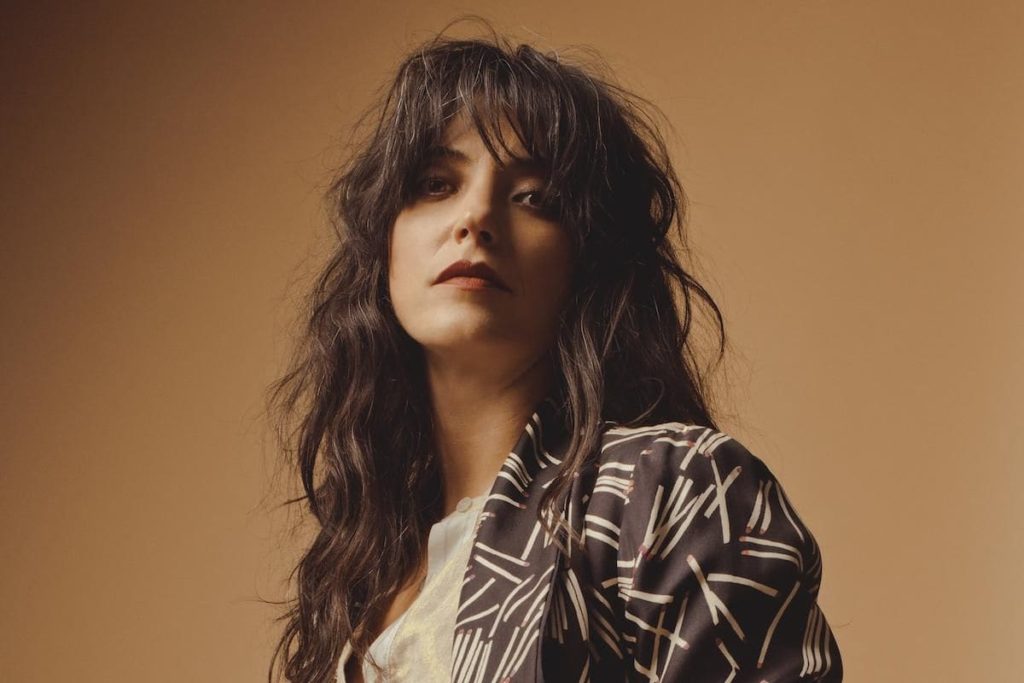
The Transcendental Experience of Seeing Sharon Van Etten Live

I know that there’s supposed to be an infinite number of universes containing an infinite number of possibilities, but I refuse to believe that there is any timeline in which Sharon Van Etten is not a rock star. There’s no way you could look at the impossibly willowy singer-songwriter and not assume she does anything other than belt out songs while strumming a ruby red hollow bodied guitar. That’s the image Van Etten cut when I saw her at the 9:30 Club on Wednesday, February 6, adorned in a long tweed jacket, flared leather pants, and uncannily matching boots– one of a readymade icon and perfect rock and roll idea. Although she looked like some kind of early Millennial re-imagining of Joan Jett or Chrissie Hynde, her effortlessly cool exterior is just a front for her intimate and vulnerable songwriting — each one of her songs lets the listener see their own reflection in the shards of Van Etten’s broken heart, and you feel the blood, sweat, and tears that go into every note. To use a music criticism cliche, she doesn’t sound like she wants to write and perform her songs so much as she seems like she has to, lest her emotions go unsaid and slowly kill her from the inside out.
The most common manifestation of Van Etten’s “confessional” songwriting (I hate using that term, it is as gendered and cliche as Mitski claims it is, but my vocabulary is escaping me at the moment) is in the form of mid-tempo to glacially paced folk-influenced ballads that chronicle the ill-fated foibles of relationships past. But, rather than reflect on the severing of old ties, Van Etten’s 2019 release, Remind Me Tomorrow, was inspired by the formation of a new one: the birth of her son. Rather than convey her feelings on motherhood through another collection of solitary, backlit tunes, Remind Me Tomorrow is a churning, coiling work of synth rock that vacillates from electronic assisted piano ballads, to undulating late-90s Smashing Pumpkins tributes, to mid-80s Springsteen-esque arena rock. The result is a viscerally appealing album that doesn’t skimp on the emotional insights of her earlier work and adds up too, in the humble opinion of this writer, her best work yet.
The question on my mind and, I imagine, most other people’s, was how she’d balance the denser synth-based tracks with the milder, folkier material from her back catalog in a live setting. The answer, it turns out, is flawlessly. No matter the timbre or instruments she’s working with, the one constant of Van Etten’s songcraft and singing is her uncommon intensity, her hellbent desire to conjure up her fears, hopes, and dreams and emblazon them in the minds of the audience.
In 2017, Van Etten appeared as a featured artist at The Roadhouse in Twin Peaks: The Return, and working with David Lynch must have given her an appreciation for thick, imposing soundscapes and moodily lit stages because, as she and her band wove through their first three songs (“Jupiter 4,” “Comeback Kid,” “No One’s Easy to Love”) the synths buzzed and lurched as if in some kind of tortured conversation, and the rotating, purple and red lighting cast her as some otherworldly being from the Black Lodge, moving in an unattainably on-beat manner only the finest frontwomen could have mastered. After the requisite “thank you for being here” she picked up her guitar and laid down “One Day” and “Tarifa” which, even without the electronic fireworks and fancy visuals, were delivered tightly, confidently, and, for lack of a better word, satisfactorily.
Really, there’s something to be said for just how good Sharon Van Etten is at her job, how, with each song, she creates a moment that you never want to be pulled out of because it captures something inherently desirable and perfect. The only thing I can compare it to is the braised short rib at a restaurant called Fat Hen in John’s Island, South Carolina. The meat is tender, almost to the point of viscosity, and flavorful to boot. Chewing it flicks on a number of pleasure centers in your brain not just because of how it tastes, but because of how it feels, and that precise mix of soupeon and texture is the closest you’ll ever come to achieving perfection. So is the audio-visual component of a Van Etten performance. It isn’t just enough to see and hear, you want to melt with the essence of what she’s achieved and have it permeate every point in time and space. You want to be her but also be seeing her, to experience that which can only be ephemeral but have it exist eternally in one moment of time. I know right now I must sound like Ted Danson describing how time works in the afterlife, but I don’t know how else to convey my response to the obsidian-like sparkle of live renditions of “Hands” and “Serpents.” It’s like a moment of religious ecstasy, but instead of hallucinating an angel wielding a golden spear my epiphany comes in the form of a woman with a shaggy haircut playing a shiny guitar.
But foisting such cosmic enormity onto Wednesday night’s performance would ignore the undeniable humanity required to pull off such a spectacle. The true highlight of the night was “Seventeen,” Van Etten’s stirring anthem of her own youth, and an early front runner for song of the year. It was at the song’s bridge that she became her most raw and vulnerable, belting out the words as she crouched to face the audience head-on. It’s a moment everyone was expecting (the studio version features a similarly go-for-broke moment), but that didn’t make it any less thrilling or impressive. Even though she figures to repeat the feat multiple times throughout this tour (D.C. was the lucky first stop), that doesn’t minimize its impact in any way.
After that song, she introduced her band, identifying them by their instrument of choice and a fun little fact (her guitarist tells a lot of jokes, her drummer is going to teach her how to salsa). It was an act she deemed important, she said, because these musicians were giving her “a year, maybe more.” That time away from home probably means more to Van Etten than ever before; in an interview with Steven Hyden, she wrestles with how it means either leaving her son for long stretches of time or forcing him to leave his friends, instead.
“I was trying to go through this quickly, and not choke up, but it means a lot that you came out here tonight,” she said to the crowd as she turned away and did indeed begin to choke up. That notion of gratitude carried through the rest of the set, which saw her play the rest of the tracks from Remind Me Tomorrow as well “Everytime the Sun Comes Up,” a cover of Sinead O’Connor’s “Black Boys on Mopeds” and, to close out the encore, “Love More.” After the last song, the band stood together, arm-in-arm, and bowed as if closing a Broadway show. I can’t remember the last time, if ever, I’ve seen a band do that, but it was a touching thing to witness.
As Van Etten’s gotten older, the sacrifices she’s had to make to pursue her artistic callings have gotten bigger and cut deeper. But what hasn’t changed is the price one has to pay to wring out the kind of perfect performance I had the privilege to see at the 9:30 Club. It requires a taxing amount of mind, body, and spirit. I’m glad that, at least for now, she’s decided that it’s all still worth it.